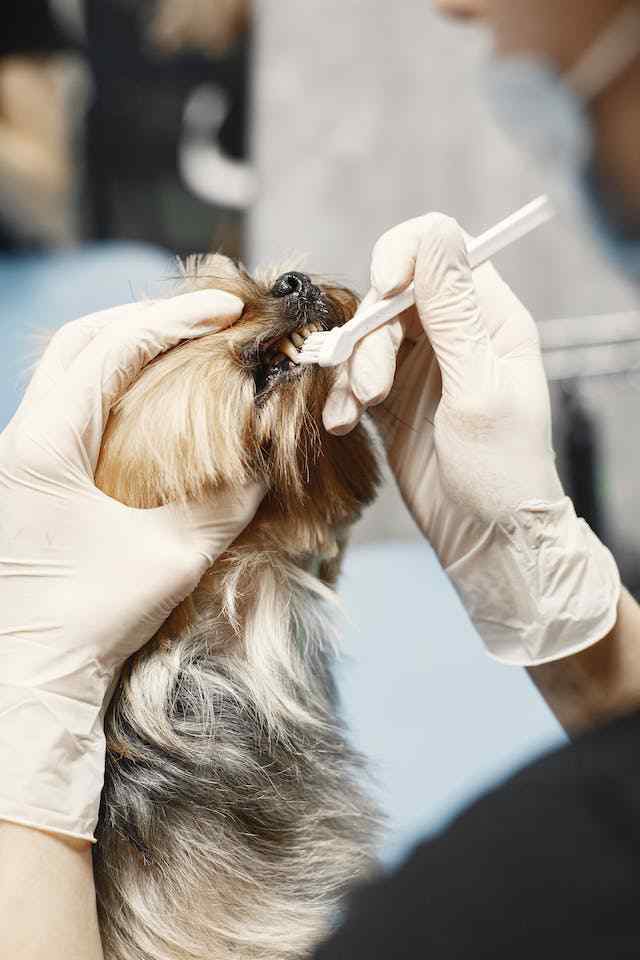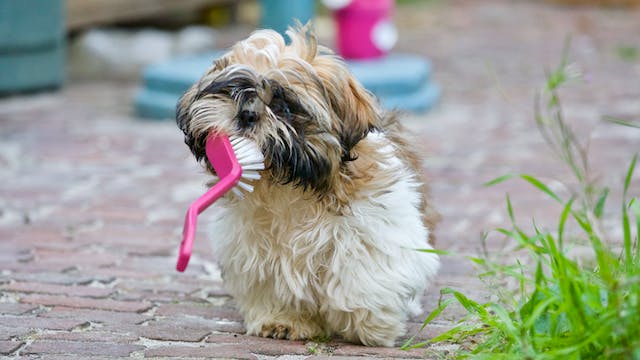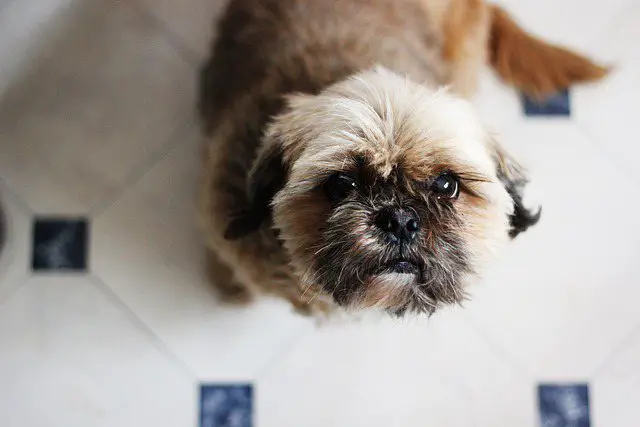Let’s talk about the oh-so-adorable Shih Tzus and their dental care.
We all know how important dental hygiene is for our furry friends, so in this article, I’ll be sharing some handy tips and tricks to keep those pearly whites sparkling and their breath smelling fresh.
Get ready to show off your Shih Tzu’s smile, because we’ve got you covered!
Shih Tzu Dental Care
Shih Tzu dental care is essential for maintaining your furry friend’s oral health. Regular brushing with a soft-bristle toothbrush and dog-friendly toothpaste is crucial to remove plaque and prevent tartar buildup.
Aim to brush your Shih Tzu’s teeth at least two to three times a week. Additionally, providing dental chew toys or treats can help promote healthy teeth and gums by reducing plaque.
Remember to schedule regular professional dental cleanings with a veterinarian to address any underlying issues and ensure a thorough cleaning.
Watch out for signs of dental problems such as bad breath, swollen gums, or difficulty eating, and seek veterinary attention if necessary.
By implementing a consistent dental care routine, you can help your Shih Tzu maintain a healthy smile and overall well-being.
The Most Effective Ways to Keep Your Shih Tzu Teeth Clean

Taking care of your furry friend’s teeth is super important, especially when it comes to Shih Tzus. These adorable pups are prone to dental issues, so it’s essential to keep their pearly whites in tip-top shape.
Here are three effective ways to keep your Shih Tzu’s teeth clean:
1. Brushing: Just like us humans, regular brushing is crucial for maintaining good oral hygiene for your Shih Tzu. Get a soft-bristled toothbrush and some dog-friendly toothpaste (avoid human toothpaste as it can be harmful to dogs).
Gently brush your pup’s teeth at least two to three times a week. Start slow and make it a positive experience by rewarding your furry friend with treats or praise.
It may take some time for your Shih Tzu to get used to it, but with patience and consistency, they’ll come to accept it.
2. Dental Chews and Toys: In addition to brushing, dental chews, and toys can be a great way to keep your Shih Tzu’s teeth clean. Look for specifically designed dental chews that help reduce plaque and tartar buildup.
These chews are usually textured to provide a gentle abrasive action against your pup’s teeth. Similarly, dental toys, like rubber chew toys or rope toys, can help remove plaque and massage their gums.
Just make sure to choose the appropriate size and supervise your pup while they enjoy their dental goodies.
3. Professional Dental Cleanings: While regular brushing and dental chews can go a long way, it’s still necessary to schedule professional dental cleanings for your Shih Tzu.
Just like humans, dogs may require a deep cleaning every once in a while. Your veterinarian can perform a thorough dental cleaning, which includes scaling, polishing, and even extractions if necessary.
They have the expertise and tools to reach those hard-to-reach areas and address any underlying dental issues that may arise.
How to Brush Your Shih Tzu Teeth
Here are the common steps to brushing your Shih Tzu teeth:
1. Get your Shih Tzu comfortable: Creating a calm and relaxed environment is crucial for a successful teeth brushing session.
Find a quiet area where you can sit with your dog and make sure they are in a comfortable position. Gently pet and soothe your Shih Tzu to help them relax and build trust.
2. Introduce the toothbrush: Before you start brushing, it’s important to introduce the toothbrush to your Shih Tzu.
Allow them to sniff and inspect the toothbrush, giving them a chance to become familiar with it. This step helps reduce any fear or anxiety associated with the toothbrush.
3. Apply toothpaste: Use a dog-friendly toothpaste that is specifically formulated for dogs. Never use human toothpaste, as it may contain ingredients that are harmful to dogs if ingested.
Squeeze a small amount of toothpaste onto the bristles of the toothbrush. Dog toothpaste often comes in flavors like chicken, beef, or peanut butter, which can make it more appealing to your Shih Tzu.
4. Lift your Shih Tzu’s lips: Gently lift your Shih Tzu’s lips to expose their teeth. Start with the front teeth and gradually work your way to the back.
This allows you to access all surfaces of their teeth more easily. Be gentle and patient, as your Shih Tzu may be resistant or nervous at first.
5. Brush in circular motions: Using the toothbrush with toothpaste, brush your Shih Tzu’s teeth in gentle circular motions. Focus on the outer surfaces of the teeth, as this is where plaque and tartar tend to accumulate the most.
Aim to brush at a 45-degree angle towards the gum line, as this helps remove plaque effectively. Avoid using excessive force or brushing too aggressively, as it can cause discomfort or bleeding.
6. Reward and praise: Throughout the brushing session, offer plenty of praise, encouragement, and rewards to your Shih Tzu.
Positive reinforcement helps create a positive association with tooth brushing and makes the experience more enjoyable for your furry friend. You can use treats, verbal praise, or even a favorite toy as a reward.
7. Gradually increase duration: Start with short brushing sessions, especially if your Shih Tzu is new to teeth brushing. Aim for 30 seconds to 1 minute initially and gradually increase the duration as your dog becomes more comfortable.
Ideally, aim for 2-3 minutes of brushing, at least a few times a week or ideally every day to maintain good dental hygiene.
8. Rinse and clean: After you finish brushing, rinse the toothbrush thoroughly with clean water to remove any remaining toothpaste or debris.
It’s important to keep the toothbrush clean and prevent the buildup of bacteria. Store the toothbrush in a clean, dry place away from other objects to maintain hygiene.
Shih Tzu Dental Problems

The following are some of the most common Shih Tzu dental problems you should know:
1. Dental Plaque
Plaque is a sticky film that forms on the teeth due to the accumulation of bacteria. Over time, if not removed, it can harden into tartar and lead to gum disease.
Regular brushing with a dog-friendly toothpaste and toothbrush is essential to remove plaque.
Aim to brush your Shih Tzu’s teeth at least two to three times a week. Additionally, providing dental treats or toys designed to promote chewing can help reduce plaque buildup.
2. Tartar
If plaque isn’t adequately removed, it can mineralize and harden into tartar, also known as calculus.
Tartar is a rough, yellowish-brown deposit that adheres to the teeth. While brushing can help prevent tartar formation, professional dental cleanings by a veterinarian may be necessary to remove existing tartar.
These cleanings typically involve scaling the teeth to remove tartar above and below the gumline.
3. Gum Disease
Gum disease, also known as periodontal disease, is a common oral health issue in dogs, including Shih Tzus.
It begins with gingivitis, which is characterized by red, swollen, and bleeding gums.
If left untreated, it can progress to periodontitis, a more severe form of gum disease that can cause tooth loss and damage to the surrounding tissues.
To prevent gum disease, regular brushing, professional dental cleanings, and a balanced diet are crucial.
In advanced cases, your veterinarian may recommend specialized treatments, such as antibiotics or periodontal surgery.
4. Tooth Loss
Poor dental hygiene and untreated gum disease can lead to tooth loss in Shih Tzus. When a tooth becomes loose or falls out, it’s important to consult a veterinarian for a thorough examination.
Depending on the situation, the veterinarian may recommend extraction of the affected tooth to prevent pain, infection, and further complications.
5. Bad Breath
Bad breath, also known as halitosis, is a common complaint among dog owners. It can be caused by various factors, including plaque buildup, gum disease, oral infections, or even underlying health issues.
Regular brushing, using dental chews or treats, and feeding a high-quality diet can help combat bad breath.
If the odor persists despite good oral hygiene practices, it’s important to have your Shih Tzu examined by a veterinarian to rule out any underlying dental problems or systemic conditions.
6. Oral Infections
Shih Tzus are prone to oral infections, such as abscesses, which are localized pockets of pus caused by bacterial infection.
These infections can result from untreated dental issues, such as tooth decay or gum disease.
Signs of an oral infection may include swelling, redness, discharge, pain, or difficulty eating. If you suspect an oral infection, it’s crucial to seek veterinary care promptly.
Treatment may involve draining the abscess, administering antibiotics, and addressing the underlying cause.
7. Malocclusion
Malocclusion refers to misalignment or abnormal positioning of the teeth. Some Shih Tzus may have malocclusion due to genetic factors or overcrowding of teeth in their small mouths.
Malocclusion can lead to oral health problems, including increased plaque accumulation, gum irritation, and difficulty eating.
Treatment options depend on the severity of the malocclusion and may include orthodontic procedures to correct the alignment, tooth extraction, or other interventions recommended by a veterinary dentist.
8. Fractured Teeth
Shih Tzus, like many small dog breeds, can be prone to tooth fractures, especially if they chew on hard objects or experience trauma to the mouth.
A fractured tooth can expose the sensitive inner layers, leading to pain, infection, and eventually tooth loss if left untreated. If you notice a broken tooth, it’s important to seek veterinary care promptly.
Treatment options may include extraction of the fractured tooth, dental bonding to restore the tooth’s structure, or other procedures recommended by a veterinary dentist.
Frequently Asked Questions
How often should I brush my Shih Tzu’s teeth?
It is recommended to brush your Shih Tzu’s teeth at least 2-3 times a week. Regular brushing helps prevent plaque buildup and promotes good oral hygiene.
Can I use human toothpaste for my Shih Tzu?
No, it is not recommended to use human toothpaste for your Shih Tzu. Human toothpaste contains ingredients that can be harmful to dogs if ingested. Instead, use a dog-specific toothpaste that is safe for your furry friend.
What if my Shih Tzu refuses to let me brush their teeth?
If your Shih Tzu is reluctant to have their teeth brushed, start by slowly introducing them to the process. Begin by letting them sniff and lick the toothpaste, then gradually move on to gently rubbing their teeth with a finger or a soft toothbrush. Patience and positive reinforcement are key in getting them comfortable with dental care.
Are dental chews and toys beneficial for my Shih Tzu’s oral health?
Yes, dental chews and toys can be beneficial for your Shih Tzu’s oral health. They help remove plaque and tartar buildup, stimulate the gums, and provide entertainment. Look for dental chews specifically designed for small breeds like Shih Tzus.
Should I schedule regular dental cleanings for my Shih Tzu?
Yes, regular dental cleanings by a veterinarian are important for your Shih Tzu’s dental health. These cleanings involve a thorough examination, professional scaling, and polishing of the teeth. Your vet can also address any underlying dental issues that may require treatment.
What signs should I look for to identify dental problems in my Shih Tzu?
Keep an eye out for signs such as bad breath, yellow or brown discoloration on the teeth, swollen or bleeding gums, excessive drooling, difficulty eating, or changes in appetite. If you notice any of these signs, it’s important to consult your veterinarian for a proper diagnosis and treatment.
Read more about Shih Tzu health concerns.
Conclusion
In conclusion, taking care of your Shih Tzu’s dental health is crucial for their overall well-being. By brushing their teeth regularly, providing dental treats, and scheduling regular check-ups with your veterinarian, you can ensure a happy and healthy smile for your furry friend. Remember, a little effort today can save you from costly dental issues down the road.


